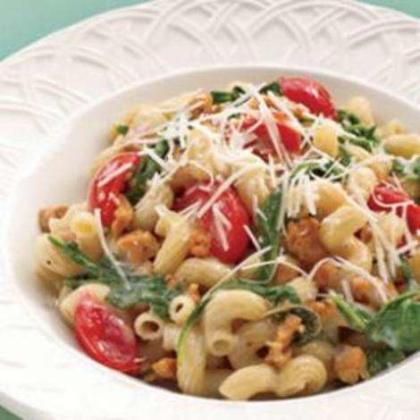4 Need-to-Know Facts About Low-Carb Diets

By Lisa D'Agrosa, Associate Nutrition Editor, EatingWell Magazine
I can't imagine my life without carbs. I've never been a fan of low-carb diets-not only because I'd miss some of my favorite foods, but also because carbohydrates offer valuable health benefits. Carbs provide your body and brain with energy. Eating the right carbs can help trim your waistline and burn fat, and going low-carb may affect your mood and make you cranky.
In case you've been confused by all the carb chatter here's what you need to know about why you should keep them in your diet.
Don't Miss: 6 Reasons You Should Be Eating Carbs
1. Carbs May Help You Lose Weight
All right, people, I'm shouting this from the rooftops because it's true-carbs don't make you gain weight! As a registered dietitian, I hear this myth about carbohydrates all the time from people asking for diet advice. Eating too much of anything-including carbs-will cause you to gain weight because you are consuming too many calories. According to a 2012 study in the Journal of Nutrition, people who regularly consumed whole grains, about 3 to 5 servings per day, were less likely to gain weight than people who rarely ate whole grains. Just be sure to keep your portion sizes in check. A serving of whole grains, like pasta or brown rice, is ½ cup (cooked) and has about 100 calories. To get your fill, make a sandwich on whole-wheat bread, use brown rice instead of white and mix it up with grains like quinoa, a gluten-free nutritional powerhouse!
Don't Miss: 6 Slimming Carbs To Keep In Your Diet
2. Carbs Are in Super-Healthy Foods
You may know that whole grains, like quinoa and whole-wheat bread, are healthy sources of carbohydrates, but many healthy vegetables contain carbohydrates too. Take corn, potatoes (both white and sweet), winter squashes (like butternut and acorn) and peas as examples. Without them you'd be missing out on essential nutrients, such as Vitamin A, potassium and fiber-a nutrient many Americans don't get enough of. Fruits, full of vitamins and antioxidants; dairy products, with calcium; and beans, which add magnesium and protein to your diet, also contain carbohydrates. Carbs are also found in not-so-healthy foods like refined grains (white rice, white bread, white pasta) and sweets like cookies and cakes. Limit these not-so-healthy foods in your diet and aim to include healthier carbs instead.
Related: 4 Healthy Carbohydrates to Help You Live Longer
3. Some Carbs Should Be Avoided
There is one kind in particular you really want to watch out for: sugar. And not just white sugar. Any added sugar, like honey, maple syrup, agave or brown sugar, counts (See our Buyer's Guide to Natural Sweeteners). Sugar is a type of carbohydrate, so anytime you're eating sweets like brownies and cookies, you're chowing down on carbs. Added sugars like those found in these sweet treats are one of the unhealthiest sources of carbohydrates. Eating lots of added sugar is linked to increased risk of heart disease. In addition, be wary of sugar lurking in less-obvious foods, like condiments, sauces and salad dressings. Some tomato sauces have 15 grams of sugar per ½-cup serving, and salad dressings can have as much as 8 grams of sugar per serving-the low-fat varieties in particular are major stealth-sugar culprits. BBQ sauce is another big offender, with up to 12 grams of sugar in just 2 tablespoons. Look for products where sugar (in any of its forms) is listed as one of the last ingredients or not listed at all to help limit your intake of added sugars. Aim for no more than 6 teaspoons (24 grams) of added sugars per day for women and 9 teaspoons (36 grams) for men.
Check Out: 3 Ways to Break Your Sugar Habit
4. Carbs Can Suppress Your Appetite
Well, some of them do. Fiber-rich whole grains, beans, fruits and vegetables all contain good carbohydrates that can help keep you feeling fuller for longer-which is key if you're trying to lose or maintain your weight. Fiber helps slow down digestion, which helps prevent your blood sugar from rising fast and then falling. Foods like white pasta, white bread and doughnuts contain simple carbohydrates, which can spike your blood sugar and make you hungrier.
Don't Miss: Quick and Healthy Low Carb Recipes and Menus
What is your favorite carb food to eat?
By Lisa D'Agrosa

Lisa D'Agrosa is EatingWell's associate nutrition editor. She earned her master's degree in nutrition communication from the Friedman School of Nutrition Science and Policy at Tufts University and attended the dietetic internship program at Massachusetts General Hospital to become a registered dietitian.
Related Links from EatingWell:
